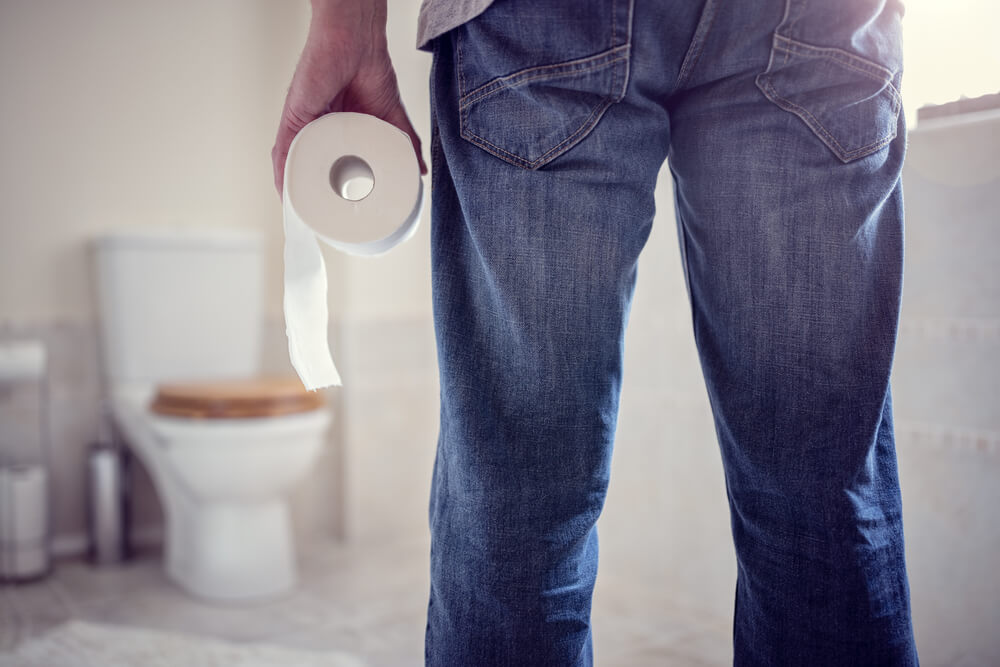
Occasional constipation is nothing to worry about. 16 percent of U.S. adults struggle with constipation, including one-third of adults ages 60 and older. According to fiber brand Metamucil, common causes of occasional constipation include a diet low in fiber, lack of physical activity, certain medications, and ignoring the body’s signals that it’s time to “go.”
For some people, constipation may become chronic, meaning it lasts several weeks or longer. 63 million people in North America struggle with chronic constipation. Most commonly, chronic constipation is due to medications, pregnancy, or chronic conditions like diabetes or irritable bowel syndrome — though rarely, it may be a sign of colon cancer.
Laxatives can be helpful to people with both occasional and chronic constipation. When occasional constipation does not respond to dietary and lifestyle changes, using an over-the-counter laxative can help get your digestion back on track. If you have chronic constipation, your doctor may prescribe a gentle daily laxative to help keep your digestion running smoothly.
Even so, you might be wondering if it’s healthy to use laxatives at all. You may have heard of laxative abuse, a compensatory behavior sometimes used by people with eating disorders, or worry that your body could become dependent on them to have a bowel movement. Today, we’re here to give you the facts about laxatives, including when it’s okay to use them — and when it isn’t.
Using Laxatives Safely
Any medication or natural substance (for example, senna tea) that stimulates a bowel movement can be considered a laxative. Most laxatives are available over-the-counter at your nearest drugstore — but that does not mean they are a safe long-term solution for constipation.
Sometimes, your doctor may prescribe a gentle daily laxative, such as Miralax, or fiber supplements, such as Metamucil, to speed the transit time of your stool and/or add bulk. This may be the case if you take a medication or have a medical condition that causes chronic constipation.
This blog post should not be construed as medical advice; you should always continue to take all medications and supplements as directed by your doctor. But what if your doctor has not recommended that you take a laxative? Can you use laxatives safely on your own?
Over-the-counter laxatives are intended for the relief of occasional constipation. Constipation is defined as having fewer than three bowel movements per week or having small, hard stools that are difficult to pass. You should never strain when having a bowel movement. Straining could be a sign that you are constipated.
Most people will experience occasional constipation in their lifetime. Constipation can result from a low-fiber diet, lack of exercise, pregnancy, or medication use. It can even occur due to a change in your typical routine, such as travel between time zones, or due to “holding in” a bowel movement for too long.
In these cases, occasional constipation will typically pass within a week or two with lifestyle changes, or when your pregnancy or course of medication is complete. Many times, constipation will pass on its own. However, sometimes, you may want or need to take an over-the-counter laxative to help get things moving again.
Laxatives produce a bowel movement in a number of ways, such as lubricating the colon or stimulating contractions of the intestines, to help you pass stool more quickly. Some types of laxatives are safer and gentler than others. Read on to learn about the different types of laxatives and how they can be safely used to relieve occasional constipation.
Bulk-forming Laxatives
Some types of laxatives work by adding fiber, or “bulk,” to the stool. This fiber can be soluble, meaning it dissolves in water, or insoluble, meaning that it does not. These types of laxatives are known as bulk-forming laxatives. Common bulk-forming laxatives include psyllium husk (Metamucil) and methylcellulose (Citrucel).
Bulk-forming laxatives should be your first choice when looking to relieve occasional constipation because they are safest and gentlest. For this reason, they are often prescribed for chronic constipation, as they can be used every day with minimal side effects. However, they will not produce instant results for those struggling with occasional constipation. It may take several days for these laxatives to provide relief from occasional constipation.
Osmotic and Lubricant Laxatives
Osmotic laxatives, like polyethylene glycol (MiraLax) and milk of magnesia (Phillips), draw water into the stool to make bowel movements softer and easier to pass. Similarly, lubricant laxatives, like mineral oil, work by making stools slippery so they can slide easily through the intestines. These laxatives are gentle, safe in the short-term, and work well for stools that are small, hard, or passed incompletely through the bowel. B
Osmotic and lubricant laxatives are gentle and effective for occasional constipation, generally producing a bowel movement overnight or within six to eight hours. Because they draw water from the intestines, osmotic laxatives should always be ingested along with plenty of water. (Some people find it helpful to combine osmotic laxatives alongside a warm beverage, such as coffee or tea, to stimulate a bowel movement.)
Unlike bulk-forming laxatives, however, osmotic and lubricant laxatives should not be used every day for chronic constipation, because these types of laxatives can create dependence with long-term use. Additionally, some types of osmotic laxatives — like milk of magnesia and magnesium citrate — can be dangerous when used by people with kidney or heart conditions, as they can lead to electrolyte imbalance.
Stimulant Laxatives
Many of the laxatives we have discussed are gentle and slow-acting. Stimulant laxatives, like bisacodyl (Dulcolax) and senna, are not. These laxatives can take as little as six hours to work and often produce uncomfortable side effects, like abdominal cramping and diarrhea.
Stimulant laxatives work by stimulating peristalsis, or rhythmic contractions of the bowel wall. During normal digestion, peristalsis helps move stool through the intestines. When you are constipated, peristalsis may occur too slowly, resulting in a type of constipation called slow transit constipation. Stimulant laxatives trigger stronger and faster contractions of the bowel wall, offering quick relief from constipation.
The fast-acting effects of stimulant laxatives lead many people to turn to them to relieve occasional constipation, despite their uncomfortable side effects. Because they are highly effective, doctors may also prescribe them to prepare the bowel for routine colonoscopies or surgical procedures.
Still, it’s important to note that the long-term effects of taking stimulant laxatives are largely unknown. These laxatives can be habit-forming and even lead to discoloration of the intestinal lining. Thus, stimulant laxatives should not be your first choice for occasional constipation, and should only be used as directed by a doctor.
Alternatives to Laxatives
Laxatives can be helpful in providing quick, short-term relief from occasional constipation — but there are also risks associated with laxative use, such as dependence or dehydration. As a result, you may want to try some natural solutions for constipation before turning to an over-the-counter laxative medication.
For many people, dietary changes can be extremely effective in relieving occasional constipation. Adding fiber to your diet is the most important change you can make to promote healthy digestion. In fact, if your diet lacks a sufficient amount of fiber, constipation can become chronic, and you may find yourself turning to laxatives more often than not.
Food sources of fiber include fruits (with the skin on), whole grains, legumes, beans, and certain seeds, such as chia and flax. Increasing the number of high-fiber foods in your diet may prevent occasional constipation from becoming a problem. Just make sure you increase your fiber intake gradually, as eating too much fiber too quickly can cause discomfort, including gas, bloating, and abdominal pain.
If you drink caffeinated beverages, many people also find that consuming coffee helps them have a regular bowel movement. These effects are still observable in people who drink decaffeinated coffee, but the laxative effect of caffeinated coffee is 23 percent stronger than that of decaf. Prefer not to drink caffeinated beverages? Prune juice also has a powerful laxative effect, as it contains sorbitol, a sugar alcohol that can stimulate a bowel movement.
What is Laxative Abuse?
Taking a laxative every once in a while to relieve occasional constipation, or as directed by a doctor, is no cause for concern. But laxative use can become unhealthy when people use laxatives for other reasons besides relieving constipation.
According to the National Eating Disorders Association (NEDA), some people misuse laxatives to eliminate unwanted calories, lose weight, “feel thin,” or “feel empty.” Laxative abuse is also a compensatory behavior used by some people with bulimia nervosa to make up for a binge; after binge eating, someone with bulimia may mistakenly believe that the laxatives will flush out the excess calories before the body can absorb them.
Laxative abuse is driven by false beliefs about the effects of laxatives on the body. The “weight loss” caused by laxative misuse contains little food, fat, or calories; instead, laxative abuse causes the loss of water, electrolytes, and minerals that our body needs to survive. The body will gain this weight back as soon as the user rehydrates by drinking fluids; refusal to rehydrate can lead to life-threatening dehydration.
Risks of Long-Term Laxative Abuse
Chronic laxative abuse with the intention of weight control can quickly become dangerous or even fatal, leading to dependence, dehydration, and/or electrolyte imbalance.
Sodium, potassium, magnesium, and phosphorous are important minerals the body needs to carry out essential functions. When these electrolytes and minerals fall out of balance, the nerves and muscles may not work properly, including those of the colon and heart. This can malnutrition (due to the inability to absorb essential nutrients), colon infection, or even heart attack in people who misuse laxatives to lose weight.
People who chronically abuse laxatives generally build a tolerance to these substances over time. As a result, they may find that they need higher and higher doses of laxatives to produce the same effects. When laxative use is stopped, these people may find that the muscles of the colon have weakened so much that they can no longer have a bowel movement without the use of laxative medications.
Taking high doses of laxatives, or chronically misusing laxatives for long periods of time, can also lead to severe dehydration. Severe dehydration can be life-threatening and may cause tremors, weakness, blurry vision, fainting, kidney damage, or even death. This type of dehydration often requires hospitalization for the administration of IV fluids. The damage caused by severe dehydration may be permanent.
Getting Help for Laxative Abuse

Laxative abuse is a manifestation of disordered thoughts and behaviors surrounding food, weight, and body image. It is both a physical and psychological health condition in need of professional treatment.
The most important thing to know about laxative abuse is that help is available. Here at The Meadowglade, our trained eating disorder therapists are experienced in working with clients who abuse laxatives to reduce these compensatory behaviors and challenge the thoughts that precede the decision to abuse laxatives.
